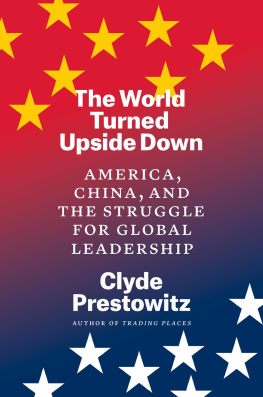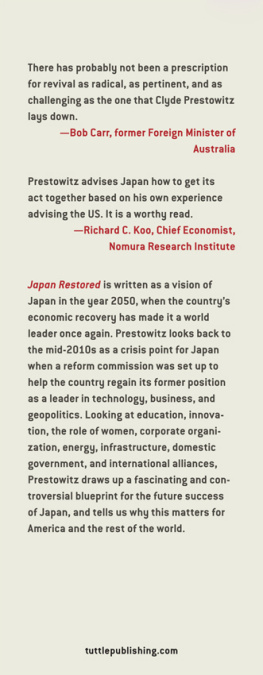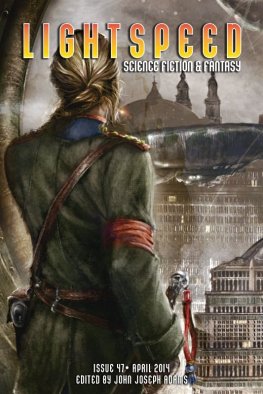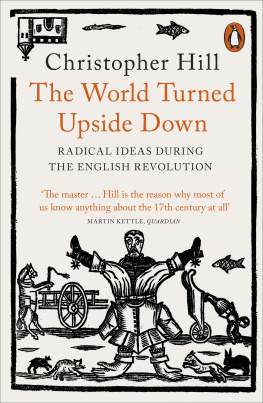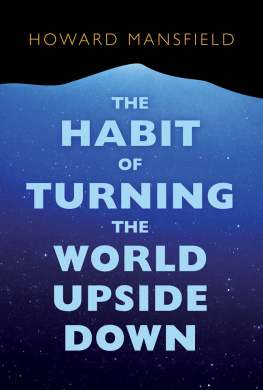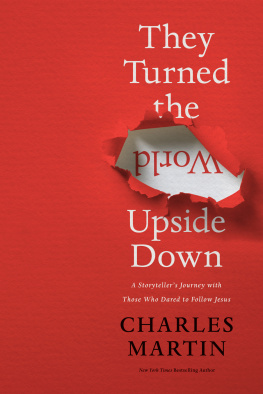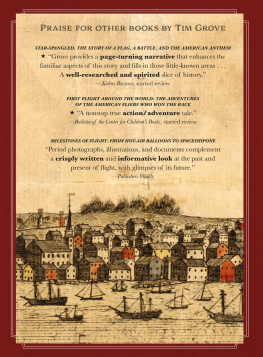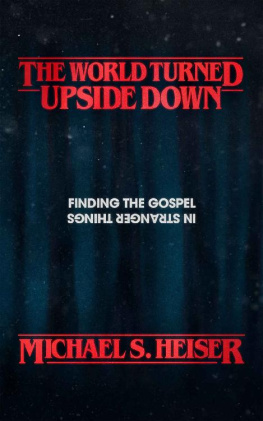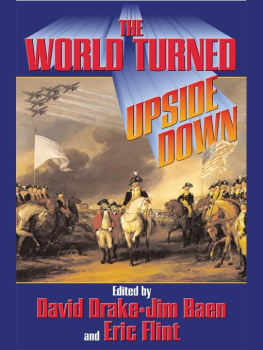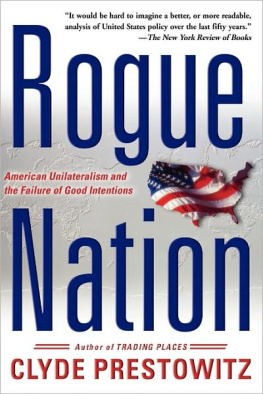Clyde Prestowitz - The World Turned Upside Down
Here you can read online Clyde Prestowitz - The World Turned Upside Down full text of the book (entire story) in english for free. Download pdf and epub, get meaning, cover and reviews about this ebook. publisher: Yale University Press, genre: Science. Description of the work, (preface) as well as reviews are available. Best literature library LitArk.com created for fans of good reading and offers a wide selection of genres:
Romance novel
Science fiction
Adventure
Detective
Science
History
Home and family
Prose
Art
Politics
Computer
Non-fiction
Religion
Business
Children
Humor
Choose a favorite category and find really read worthwhile books. Enjoy immersion in the world of imagination, feel the emotions of the characters or learn something new for yourself, make an fascinating discovery.
- Book:The World Turned Upside Down
- Author:
- Publisher:Yale University Press
- Genre:
- Rating:5 / 5
- Favourites:Add to favourites
- Your mark:
- 100
- 1
- 2
- 3
- 4
- 5
The World Turned Upside Down: summary, description and annotation
We offer to read an annotation, description, summary or preface (depends on what the author of the book "The World Turned Upside Down" wrote himself). If you haven't found the necessary information about the book — write in the comments, we will try to find it.
The World Turned Upside Down — read online for free the complete book (whole text) full work
Below is the text of the book, divided by pages. System saving the place of the last page read, allows you to conveniently read the book "The World Turned Upside Down" online for free, without having to search again every time where you left off. Put a bookmark, and you can go to the page where you finished reading at any time.
Font size:
Interval:
Bookmark:
The World Turned
Upside Down

Copyright 2021 by Clyde Prestowitz. All rights reserved. This book may not be reproduced, in whole or in part, including illustrations, in any form (beyond that copying permitted by Sections 107 and 108 of the U.S. Copyright Law and except by reviewers for the public press), without written permission from the publishers.
Yale University Press books may be purchased in quantity for educational, business, or promotional use. For information, please e-mail (U.K. office).
Set in Galliard and Gotham types by IDS Infotech Ltd. Printed in the United States of America.
Library of Congress Control Number: 2020940160
ISBN 978-0-300-24849-4 (hardcover : alk. paper)
A catalogue record for this book is available from the British Library.
This paper meets the requirements of ANSI/NISO Z39.48-1992 (Permanence of Paper).
10 9 8 7 6 5 4 3 2 1
Contents
The World Turned
Upside Down

The U.S.-China Balance of Power.
Introduction
When the facts change, I change my opinion. And what do you do, sir?
John Maynard Keynes
In 1991, having emerged triumphant from the Cold War, America and the free world countries experienced a wave of euphoria. The classic expression of the eras geopolitical mood was Francis Fukuyamas book The End of History and the Last Man, which reported that the conquest of the world by democracy and free market capitalism was irresistible and permanent.
China did not appear to be an exception. It was still ruled by the Chinese Communist Party (CCP), and thus continued to call itself a communist country. But the CCP was led by the pragmatic Deng Xiaoping, who famously commented that it matters not whether a cat is black or white, so long as it catches mice. True, Deng had ordered the massacre of hundreds and perhaps thousands of students and workers demonstrating for democracy in Beijings Tiananmen Square and throughout the country on June 45, 1989. (An estimate from the U.S. embassy in Beijing put the number of deaths at five hundred to twenty-six hundred. Most casualties were reported to have occurred on Changan Avenue, outside the square.) But he assured global leaders that this was just domestic politics, and it should in no way deter them from taking advantage of Chinas ultra-low wages by using it as a production location from which to export to world markets and to sell into the growing China market.
One of the first to do so was Robert Galvin, the CEO and chairman of Motorola and the son of its founder. He once told me that the Tiananmen Square incident had created a great opportunity for his company. The Chinese, he said, desperately needed investment and technology, and because of all the bad press they were willing to make significant concessions to attract foreign companies. He hurried to Beijing, where he offered to put Motorola factories in China on the condition that Motorola retain 100 percent ownership of the business. Standard Chinese policy had been to require joint ventures with Chinese partners, but as Galvin had anticipated, Deng and company made an exception for Motorola, which hastened to begin offshoring its production from the United States to China. Other U.S. and global CEOs soon followed suit.
Nor was there any pushback from Western governmentsquite the opposite. President William Clinton called for engagement. Regarding Chinas possible censorship of the then new internet, Clinton scoffed that that would be like trying to nail Jell-O to the wall. In this he was supported by U.S. trade representative Charlene Barshefsky, who said it was a no brainer that the internet would lead to Chinas liberalization. The government is not going to be able to control content. It is not going to be able to control access. The Net is going to have the single most profound change on China, engendering tremendous pressure on the Chinese leadership.
In 2001, the U.S. government backed Chinas entrance into the World Trade Organization (WTO). A key argument in favor of this move was that the greatest potential danger to the world would not be a rapidly developing China but rather an economically failing China. This kind of assessment was often followed by another, expressed by former deputy secretary of state Robert Zoellick, who asserted that the United States and its allies wanted China to be a responsible stakeholder in the global system.
I was reminded of this when my chief research assistant, Joel Fischl, was tardy in responding to my request for information during his tour of southern China in the spring of 2019. When he finally emailed me from Manila, he began, I wanted to write a version of this email to you while I was in China, but I was nervous about doing so. I self-censored myself for fear of writing anything critical of China while I was in the country. Maybe this is paranoid, but thats what I was thinking. Although the likelihood of being detained while in China for writing this was low, it was high enough in my considered opinion to prevent me from doing it.
A Mandarin speaker with twenty-five years experience living in Asia (twenty of them as a U.S. commercial diplomat, including five years in Beijing and Shanghai and six years in Hong Kong and Taipei), Fischl added that the CCP has succeeded in teaching 1.4 billion Chinese peopleone-fifth of humanityan alternate version of history by creating an alternate internet and establishing an alternate to the reality seen by the rest of the world. The Chinese people, he wrote, can only get the facts that are approved by the CCP. Few, if any young people have any knowledge of the Tiananmen Square incident. Few are aware of the true nature of the reeducation camps established for the Muslim Uighur people in Xinjiang province or ... that the CCP has virtually succeeded in wiping out the entire Tibetan culture. The most frightening thing is their ability to spread and sell their authoritarian model of government not just to other dictators and oppressive regimes, but to countries such as Thailand and Ecuador who like the idea of security cameras, facial recognition software etc. to help maintain political power. Chinaslowly but surelyis reordering some parts of the world in its own image.
When China joined the WTO in December 2001, it was an authoritarian state with an $80 billion trade surplus (technically a current account surplus) with the United States and a $1.3 trillion annual GDP. This was a bit more than one-tenth the U.S. GDP of $10.5 trillion. The United States was the world leader in a wide variety of high-technology industries like telecommunications, avionics, and semiconductors, while China was concentrating on producing shoes, textiles, steel, and concrete. Top U.S. officials like U.S. trade representative Barshefsky and commerce secretary Mickey Kantor told Congress that admitting China to the WTO would cut the U.S. trade deficit in half because Chinas high tariffs would be greatly reduced while the low U.S. tariffs wouldnt change. In other words, it seemed China was making all the concessions. The result, they said, would be millions of new high-paying U.S. jobs.
Over the next twenty years, that forecast proved embarrassingly false. The U.S. trade deficit with China hit nearly $400 billion in 2018 and was accompanied by the loss of 5 million jobs.2009, GE announced it was merging this division into a joint venture with the Chinese state-owned Aviation Industry Corporation (AVIC) and moving operations to a headquarters in Shanghai. At first blush, this seemed like a strange decision on two counts. First, avionics are not a labor-intensive product and China had no previous avionics production experience. This was the kind of product that economists said should be made in capital- and technology-rich countries like the United States, rather than in low-wage countries like China, because very few worker hours were necessary to make avionics products. Second, GEs CEO and chairman Jeff Immelt was also at that time the chairman of President Obamas Commission on Jobs and Competitiveness. It seemed odd that a person in that capacity would want to be seen sending high-tech, high-paying jobs out of the United States.
Next pageFont size:
Interval:
Bookmark:
Similar books «The World Turned Upside Down»
Look at similar books to The World Turned Upside Down. We have selected literature similar in name and meaning in the hope of providing readers with more options to find new, interesting, not yet read works.
Discussion, reviews of the book The World Turned Upside Down and just readers' own opinions. Leave your comments, write what you think about the work, its meaning or the main characters. Specify what exactly you liked and what you didn't like, and why you think so.

